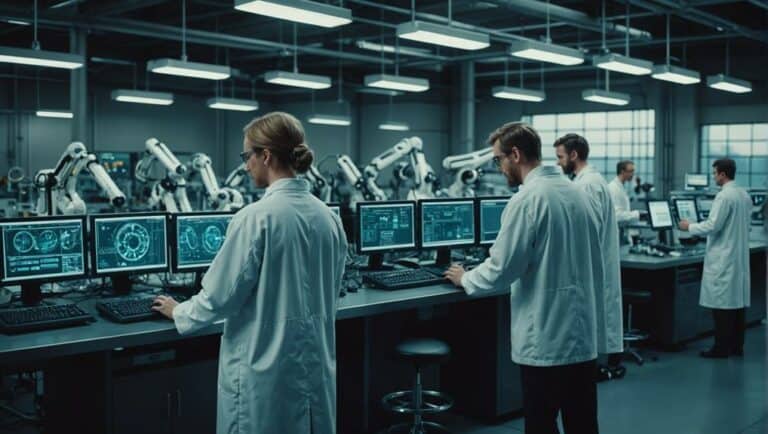Discover how breakthroughs in space exploration, AI-driven protein prediction, and synthetic biology are revolutionizing industries from telecommunications to sustainable agriculture.
Dive in to explore how these advancements are shaping the future of innovation and global collaboration.
Space Exploration Milestones
Space exploration milestones haven't only expanded our understanding of the universe but have also driven technological innovations that impact our daily lives. One major milestone is NASA's Artemis Program, which aims to send the first woman and next man to the Moon by 2024. This mission isn't just about lunar exploration; it also represents significant advancements in propulsion and life support technologies. These innovations could eventually be applied to real-world industries, enhancing everything from telecommunications to satellite imaging.
The James Webb Space Telescope is another groundbreaking project. By capturing stunning photos of galaxies, stars, and other celestial objects, it provides invaluable data that deepens our cosmic knowledge. Its advanced imaging technology might also benefit fields like weather forecasting and environmental monitoring.
Future Mars missions are in the planning stages, with a primary focus on searching for signs of past life. These missions will likely push the boundaries of robotics and autonomous systems, which could translate into more sophisticated industrial automation here on Earth.
Space exploration doesn't just help us understand the universe; it also drives technological advancements that ripple through various sectors, improving our everyday lives in ways we mightn't expect.
AI in Protein Prediction

Leveraging cutting-edge AI technologies like AlphaFold2, the field of protein prediction has seen unprecedented advancements that are transforming life sciences research and drug development. These AI advancements, including AlphaFold, RoseTTAFold, and trRosettaX-Single, have drastically reduced the number of unknown human protein structures from 4,800 to just 29.
This leap in protein structure prediction accuracy is reshaping workflows in both protein research and drug development, enabling scientists to understand biological processes at a much deeper level.
AlphaFold's ability to predict protein structures with high precision addresses one of the most complex challenges in protein modeling—accurately representing proteins, even those with disordered properties. The implications of these advancements extend across various life sciences disciplines, from understanding disease mechanisms to designing novel therapeutics.
By providing detailed protein models, these AI systems allow researchers to accelerate drug discovery and development processes, notably cutting down the time and resources needed.
In essence, AI-driven protein structure prediction isn't just a technological breakthrough; it's a paradigm shift that enhances our ability to tackle some of the most pressing biological and medical challenges today.
Synthetic Biology Innovations
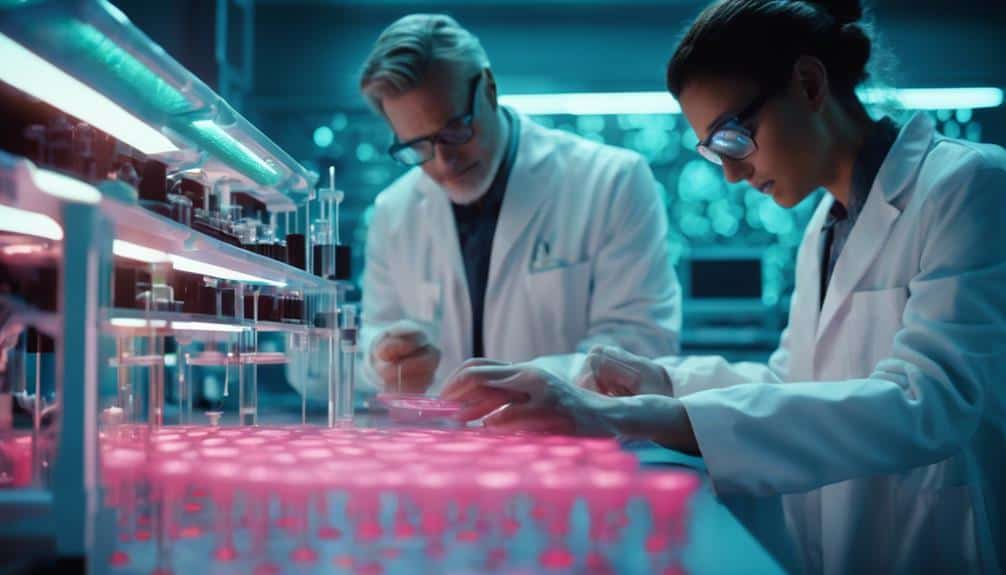
Building on the transformative impacts of AI in protein prediction, synthetic biology innovations are redefining how we engineer biological systems to manufacture biomolecules and materials with unprecedented efficiency. By leveraging AI-based metabolic modeling, you can predict and optimize metabolic pathways, streamlining the production of complex biomolecules. This precision is further enhanced by CRISPR tools, which allow precise genetic modifications that fine-tune metabolic functions within engineered biological systems.
Synthetic biology isn't just about improving production efficiency; it also addresses supply chain challenges. Engineered biological systems can be tailored to produce biopolymers and other sustainable materials, reducing reliance on traditional manufacturing methods that are often resource-intensive and environmentally damaging. For instance, bacteria and yeast can be engineered to synthesize high-value compounds, providing innovative solutions for industries ranging from pharmaceuticals to biodegradable plastics.
The integration of AI-based metabolic modeling and CRISPR tools in synthetic biology opens up new possibilities for creating sustainable materials and high-efficiency biomolecule production. These advancements not only promise to revolutionize manufacturing but also offer a pathway to more sustainable industrial practices.
Metabolomics in Disease Detection

You can gain crucial insights into cellular metabolism and functions through single-cell metabolomics, enhancing early disease detection.
With advancements in mass spectrometry technology, these analyses have become more precise and sensitive, improving their diagnostic utility.
Single-Cell Metabolomics Insights
Single-cell metabolomics offers unprecedented insights into cellular functions and disease mechanisms by analyzing metabolic changes at the individual cell level. By employing advanced mass spectrometry, researchers can precisely measure the metabolites within single cells, revealing intricate details about cellular heterogeneity and metabolic pathways. This level of detail is particularly pivotal for disease detection, where understanding the metabolic variations between healthy and diseased cells can lead to groundbreaking diagnostics.
In the context of cancer detection, single-cell metabolomics enables the identification of unique metabolic signatures that distinguish cancerous cells from normal ones. This capability not only improves early detection but also aids in tailoring personalized treatment strategies by understanding how individual cancer cells respond to therapies. The ability to pinpoint these metabolic changes at such a granular level provides a clearer picture of disease progression and potential intervention points.
Furthermore, by mapping the metabolic pathways within individual cells, researchers can uncover new biomarkers for a variety of health conditions, enhancing the accuracy and reliability of diagnostic tests. Single-cell metabolomics, with its potential to revolutionize disease diagnosis, offers a promising future where medical interventions are more precise and effective, ultimately improving patient outcomes.
Advanced Mass Spectrometry Techniques
Utilizing state-of-the-art advancements in mass spectrometry, researchers are now able to dive deeply into cellular metabolism, revealing vital metabolic biomarkers that improve disease detection and diagnosis.
Advanced mass spectrometry techniques enable detailed analyses of cellular functions and metabolic pathways, offering unprecedented insights into the complex biochemical processes that underpin health and disease.
By leveraging these advanced techniques in metabolomics, scientists can identify specific metabolic biomarkers that signal the presence of diseases like cancer with remarkable accuracy. This level of precision in detecting changes in cellular metabolism allows for earlier and more accurate diagnosis, paving the way for more effective treatments.
The integration of mass spectrometry in metabolomics is also driving the evolution of personalized medicine. By understanding an individual's unique metabolic profile, healthcare providers can tailor treatments to the specific needs of each patient. This personalized approach not only enhances treatment efficacy but also minimizes potential side effects.
In essence, advanced mass spectrometry techniques are transforming the landscape of disease detection and personalized medicine. They offer a powerful tool for probing the intricate web of cellular metabolism, ultimately leading to innovations that could save countless lives.
Early Disease Detection
Metabolomics is revolutionizing early disease detection by uncovering intricate metabolic changes at the cellular level. By leveraging sophisticated metabolomic approaches, researchers can now reveal the underlying cellular functions and detect subtle metabolic shifts that signal the onset of diseases.
One essential advancement is single-cell metabolomics, which provides detailed insights into the metabolism of individual cells. This allows for the identification of specific disease biomarkers, greatly enhancing the ability to diagnose conditions at their earliest stages.
The role of mass spectrometry technology can't be overstated in this scenario. Recent advancements have greatly improved the accuracy and sensitivity of detecting metabolic changes, making it easier to identify cancerous cells through metabolic profiling. This precision is particularly important for early cancer detection, where timely intervention can drastically improve patient outcomes.
Moreover, the application of metabolomics in disease detection opens new avenues for personalized medicine. By understanding the unique metabolic profiles of individuals, healthcare providers can tailor treatments and therapies to the specific needs of each patient. This approach promises more effective and targeted healthcare solutions, ultimately leading to better disease management and improved quality of life.
Therefore, metabolomics stands at the forefront of a new era in medical diagnostics.
Green Fertilizer Production
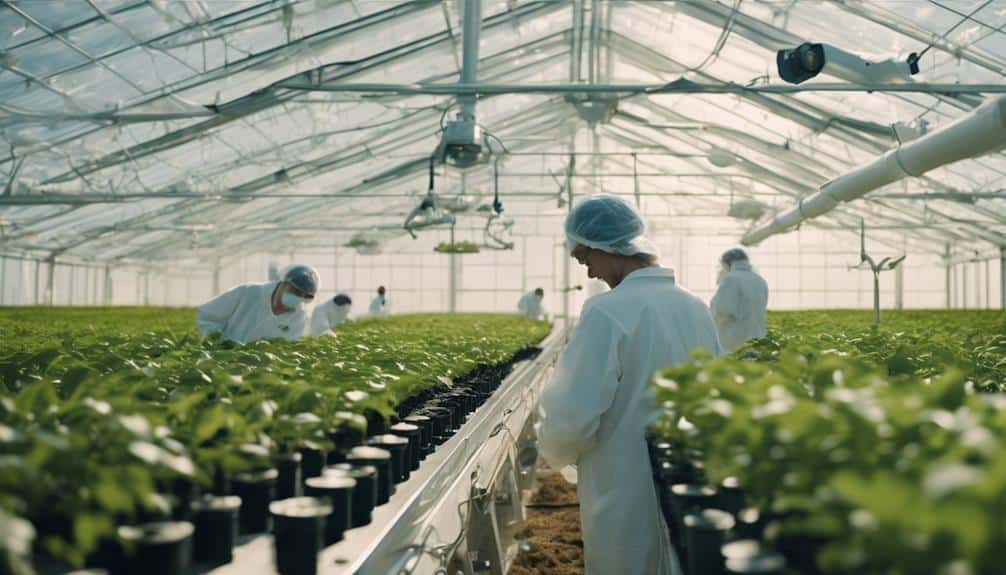
Tokyo Tech researchers have made a notable leap in green fertilizer production by developing noble-metal-free nitride catalysts that greatly reduce energy requirements in ammonia synthesis. This breakthrough addresses the urgent need for energy efficiency and sustainability in the agricultural sector. By utilizing lanthanum nitride support, these catalysts not only offer stability but also make the production process more affordable.
You might wonder how this impacts ammonia production, essential for fertilizers. Traditional methods rely heavily on energy-intensive processes and costly noble metals like platinum. In contrast, Tokyo Tech's approach utilizes active metals such as nickel and cobalt, which are both efficient and cost-effective. This innovation could revolutionize the way we produce fertilizers, reducing both costs and environmental impact.
Energy efficiency is crucial in any sustainable method, and these noble-metal-free catalysts excel in this area. By minimizing energy consumption, they contribute significantly to a greener future in agriculture. Furthermore, the stability provided by lanthanum nitride support ensures that the catalysts can be used reliably over time, further enhancing their practicality.
Decline in Breakthroughs

A recent study has revealed a concerning trend: the rate of groundbreaking scientific advancements has been on a steady decline since 1945. Despite the increasing volume of research, scientists are now focusing more on incremental progress rather than revolutionary discoveries. This shift has led to a significant slowdown in the pace of true innovative breakthroughs, causing alarm within the scientific community.
The phenomenon of diminishing returns in science investments is becoming more evident. As resources are poured into research, the output of transformative discoveries isn't matching up, highlighting a potential crisis in scientific innovation. This trend isn't just a statistical anomaly but a real shift in how scientific endeavors are conducted and rewarded.
Incremental progress, while valuable, lacks the dramatic impact of revolutionary discoveries that have historically driven major leaps in understanding and technology. The current trajectory suggests that the scientific community may need to reassess its priorities and approaches to foster an environment where significant advancements can flourish once again.
Understanding this decline in scientific advancements is essential for addressing the underlying issues and ensuring that future research continues to drive significant progress. The need for a strategic pivot towards fostering revolutionary discoveries can't be overstated.
Factors Influencing Discoveries
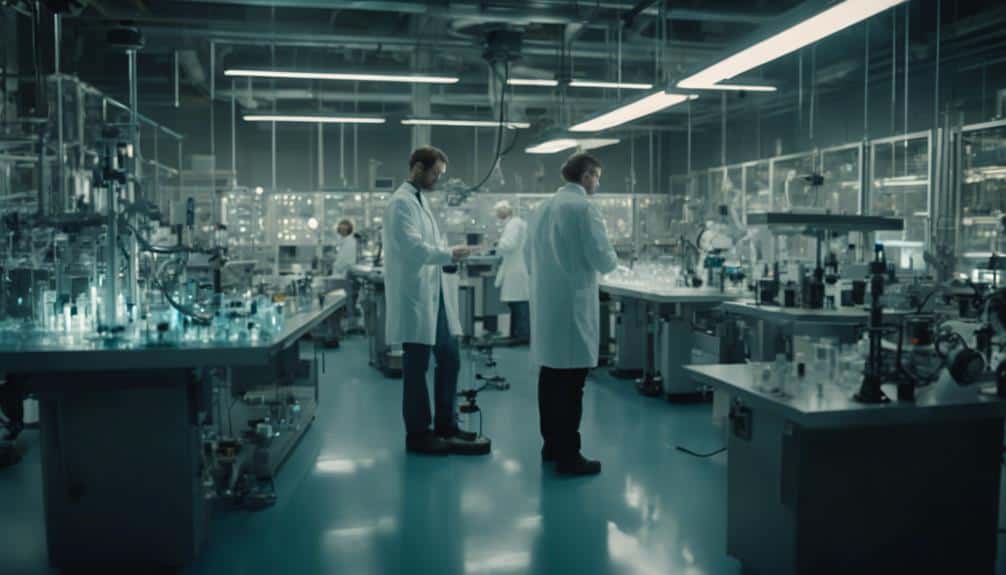
Technological advancements, global collaboration, and policy changes collectively shape the landscape of breakthrough discoveries in science. Access to cutting-edge technology, like artificial intelligence, greatly speeds up scientific progress by enabling complex data analyses and simulations.
Global collaboration fosters interdisciplinary approaches, merging insights from diverse fields to tackle pressing issues such as climate change and space exploration.
Education and resource availability are fundamental in driving innovation. When scientists have access to robust educational frameworks and ample resources, they're better positioned to make groundbreaking discoveries.
For instance, bioengineering and genetics are poised to revolutionize medicine and agriculture, thanks to substantial investments in research and development.
However, scientific progress doesn't exist in a vacuum. Societal implications and ethical dilemmas often influence the direction of research. Public interest can drive funding and policy support, but it can also raise concerns about privacy, safety, and moral considerations.
Navigating these ethical challenges is essential for scientists to maintain public trust and achieve meaningful advancements.
Impact on Industry
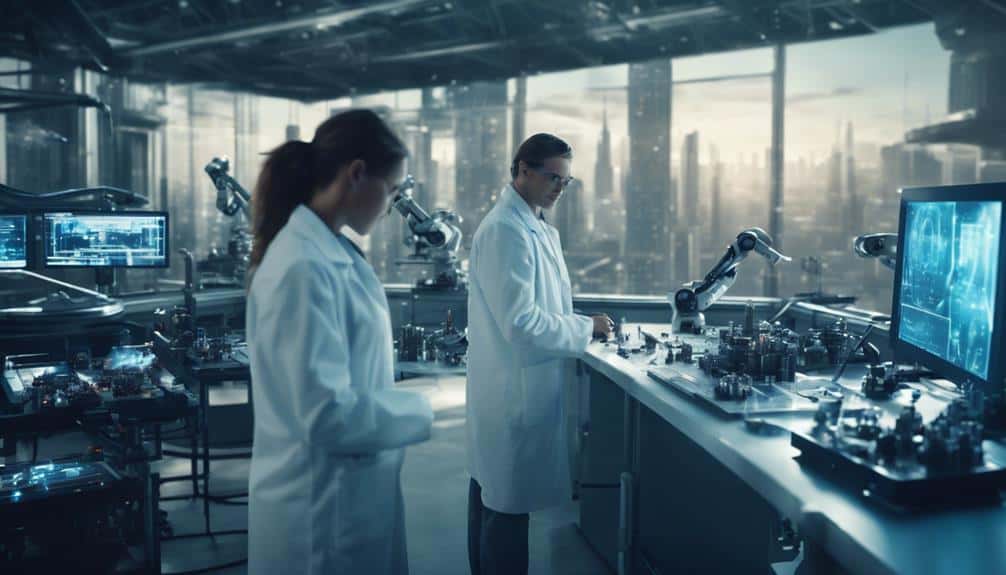
Scientific breakthroughs have fundamentally reshaped industries, driving innovation and transforming business operations across various sectors. You'll find that groundbreaking developments in science have led to notable advancements in industry sectors like aerospace, biotechnology, and energy.
Consider these key impacts:
- Aerospace: Technological breakthroughs in materials science have resulted in lighter, stronger composites, enhancing fuel efficiency and performance.
- Biotechnology: Scientific discoveries in genetics and molecular biology have led to revolutionary treatments and therapies, improving healthcare outcomes.
- Energy: Advances in renewable energy technologies, such as solar and wind power, have drastically improved sustainability and reduced reliance on fossil fuels.
The intersection of science and industry doesn't just create new products; it transforms entire manufacturing processes. These advancements have made production more efficient and sustainable, allowing businesses to operate at lower costs while minimizing environmental impact.
Moreover, these scientific breakthroughs pave the way for novel solutions and services that notably improve the quality of life. For instance, innovations in biotechnology not only provide cutting-edge medical treatments but also open new avenues for tackling global health challenges.


